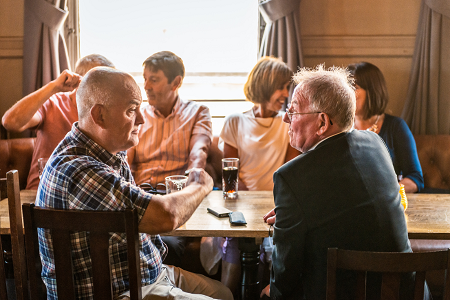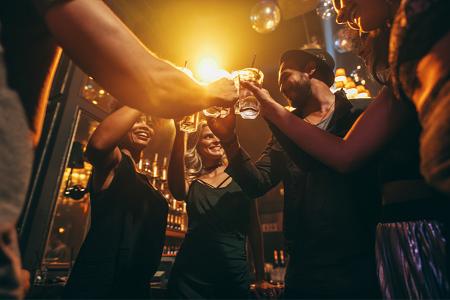Sports and social clubs are safer than most types of licensed premises, but ‘being Licensing SAVI will help improve their safety record every year’
Nearly two out of every three adults want improved safety measures in sports and social clubs following recent national publicity around the safety of women and girls, a YouGov survey has found.
With safety defined as ‘where efforts have been made to prevent crime, reduce harm and where staff will support you if you are feeling vulnerable’, 5,050 adults in England aged 18-45, were asked whether they agreed with the statement that ‘recent publicity around the safety of women and girls has made it more important for licensed premises to improve their safety procedures’.
In response, 62% of adults want safety improvements in sports and social clubs. The greatest calls for safety improvements were in nightclubs (79%), bars and pubs (76%), stadiums and arenas (65%) and hotels and guest houses (64%). The lowest calls for safety improvements were in restaurants (58%) and theatres (52%).
However, across all licensed premises in the survey the calls for improved safety were largest from women – particularly in sports and social clubs where the percentage difference between men and women was one of the highest – with 56% of men wanting improvements compared to 69% of women – a percentage difference of 13. Only restaurants had a greater percentage difference of 14.

The survey, carried out between 16 August – 5 September 2021, also found that adults feel significantly less safe across all types of licensed premises included in the survey today than they did prior to the first national lockdown in March 2020. For example, the largest falls in feeling safe were in nightclubs – down 33 percentage points from 81% pre-pandemic to 48% today; bars and clubs down 29 percentage points from 93% to 64%; stadiums and arenas down 27 percentage points from 92% to 65% and sports and social clubs down 22 percentage points from 95% to 73%.
The licensed premises with the lowest percentage points falls were theatres and restaurants with percentage point falls of under 20.
The survey also revealed that 18% of respondents would have visited sports and social clubs more if they felt safer – this was the lowest figure across all licensed premises. This may be because people feel safer in this type of venue due to the bespoke social activities and entertainment that take place and the familiarity of patrons with each other due to membership, regular attendance and loyalty from within the local community.
A total of 17% of respondents check out the safety of sports and social clubs prior to visiting and 18% look for safety considerations once they have arrived. These percentages are significantly lower than other licensed premises like hotels and guests houses at 36% and 30%, and stadiums and arenas at 21% and 28% respectively. Again, these results for sports and social clubs need to be considered within the context of meeting the needs of their local communities rather than the wider range of visitors from further afield that you would expect to visit hotels and guest houses, and stadiums and arenas.

In addition, when respondents were asked about their perception of safety upon arrival at licensed premises they generally had fewer concerns with sports and social clubs than with other types of venues – most likely because of their familiarity with these local venues. The main concerns in sports and social clubs were cleanliness and hygiene (40%), the premises being well-lit (39%) and clearly marked fire exits (37%). This contrasts with restaurants where adults were most concerned about cleanliness and hygiene (60%) and in nightclubs where they prioritised door entry control (57%).
These safety feature priorities are broadly the same once inside and moving around within sports and social clubs. A total of 47% of respondents are looking for the venue to be well-lit; 46% for cleanliness and hygiene and 44% clearly marked fire exits.
Also, 23% of adults are more likely to have visited sports and social clubs if they had been granted a Police Safety Award.
The survey was commissioned by Police Crime Prevention Initiatives (Police CPI), a police-owned organisation, which works alongside the Police Service to deter and reduce crime.
One of Police CPI’s latest initiatives is Licensing Security & Vulnerability Initiative (Licensing SAVI), which seeks to improve safety and security in licensed premises. Developed at the request of the Home Office, Licensing SAVI is being supported by the National Police Chiefs’ Council and Project Servator, which seeks to deter terrorist attacks in public places.
Licensing SAVI brings together for the first time all the information that licensees need to meet the requirements of police and council licensing teams, comply with the Licensing Act 2003 and promote the four Licensing Objectives: Prevention of Public Nuisance, Prevention of Crime and Disorder, Protection of Children from Harm and Public Safety.
Available as an on-line self-assessment, it provides definitive information on effective management practices and operational security as well as some straightforward safety measures, many of which can be introduced quickly and at little or no cost. It leads to a star-rating and venues can apply for an award, which can be displayed at their premises showing the efforts undertaken to enhance safety and security.
Licensing SAVI is the first ever National Policing Award in England and Wales and commenced its national roll out in October to 300 venues in West Yorkshire – a move that is being funded by the West Yorkshire Violence Reduction Unit and delivered in partnership with the West Yorkshire Health and Care Partnership.
Mark Morgan, Business Manager for Licensing SAVI, and a former Police Superintendent, said: “There is a tremendous consistency in these results which show how important safety in licensed premises has become today for men and women – but particularly women.
“Clearly, adults who took part in this research feel safer in sports and social clubs than they do in many other types of licensed premises. However, safety is still an important and significant factor in sports and social clubs with nearly one in five adults saying they would visit more if they felt safer and more than one in five adults saying that would visit if the venue had a police safety award.
“Having been personally involved in local sports clubs or dealing with issues arising at both sports and social clubs from a policing perspective for many years, I know how such venues look to diversify to increase income streams by holding events such as 18th birthday parties where youngsters are potentially vulnerable.
“It is really important for staff to understand the risks that are sometimes posed if not managed properly and Licensing SAVI helps to identify good practice to ensure safety, maintain a good reputation and ultimately be the destination of choice for such gatherings.”
Mark explained that Licensing SAVI enables licensed premises to carry out a health check on their venue and improve safety and security year-on-year. “This has got to be good for staff and customers – and good for business too.”